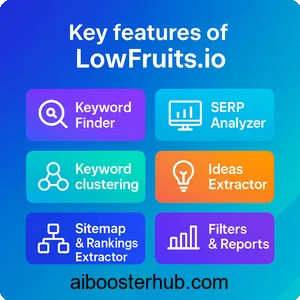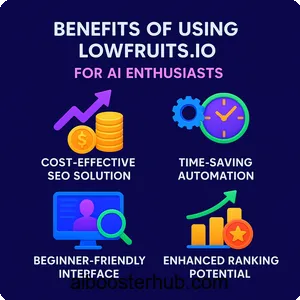Unveiling Lowfruits: Top AI Keyword Tool for SEO Success
In the rapidly evolving world of artificial intelligence, optimizing a website for search engines is crucial for reaching the right audience. Lowfruits, a powerful keyword research tool, stands out as an invaluable asset for bloggers and website owners looking to enhance their SEO strategies with low-competition keywords.

This article dives deep into Lowfruits, exploring its features, uses, benefits, and a step-by-step usage guide, tailored for those interested in leveraging AI-driven tools to boost their online presence.
Content
Toggle1. Introduction to Lowfruits
What is Lowfruits?
Lowfruits is a keyword research tool that uncovers low-competition “low-hanging fruit” keywords to boost website rankings. Unlike SEMrush or Ahrefs, it emphasizes simplicity, affordability, and precision, ideal for bloggers, niche site owners, and AI enthusiasts. Using Google’s Autosuggest API and proprietary data, it finds easy-to-rank keywords, driving targeted organic traffic to AI websites.
Why it matters for AI websites
For AI-focused websites facing fierce competition across topics like machine learning and AI ethics, finding untapped keywords is vital. Lowfruits helps discover long-tail keywords like “best AI tools for data analysis” or “AI for small businesses.” Its user-friendly design and focus on low-competition keywords make it essential for building topical authority in AI.
2. Key features of Lowfruits

Keyword Finder (KWFinder)
For AI websites with intense competition in areas like machine learning and AI ethics, uncovering untapped keywords is crucial. Lowfruits finds long-tail keywords such as “best AI tools for data analysis” or “AI for small businesses.” Its intuitive interface and emphasis on low-competition keywords make it vital for establishing AI topical authority.
SERP Analyzer and weak spots
Lowfruits’s SERP Analyzer examines search engine results pages to find “weak spots”—keywords where low-authority domains, forums, or user-generated content like Reddit or Quora rank highly. This is valuable for AI websites, revealing chances to outrank poorly optimized content. For example, if “AI for content creation” has low-domain-authority sites, Lowfruits marks it as a key target for your strategy.
Keyword clustering
Keyword clustering, a key feature, groups related keywords to simplify content planning. For AI websites, it enables creating one detailed article for a cluster like “AI in healthcare,” including terms like “AI diagnostics tools” and “machine learning in medical imaging.” This boosts topical authority, aligning with Google’s E-E-A-T guidelines to improve site rankings.
Ideas Extractor
The Ideas Extractor feature lets users analyze a competitor’s website or URL to uncover keyword ideas. For AI-focused sites, it helps study top AI blogs or tool directories, revealing keywords you might miss. It’s ideal for finding trending topics like “AI for cybersecurity” or “ethical AI frameworks,” keeping your content relevant and competitive.
Sitemap and Rankings Extractor
Lowfruits’s Sitemap and Rankings Extractor tools analyze a website’s sitemap or ranking keywords to reveal its SEO strategy. For AI websites, this shows how competitors organize content on topics like “AI automation tools” or “deep learning platforms.” It helps you refine your approach and target gaps in their coverage.
Customizable filters and reports
Lowfruits offers advanced filters to refine keyword searches by country, language, domain authority (DA), and search intent. For an AI website targeting global audiences, you can focus on English keywords with a DA up to 20, suitable for newer sites. Exportable reports simplify collaboration with content teams or clients.
3. Uses of Lowfruits for AI websites
Building topical authority
In the AI niche, establishing topical authority is essential for ranking well on Google. Lowfruits helps by identifying clusters of low-competition keywords that allow you to create in-depth content around specific AI subtopics, such as “AI in marketing automation” or “AI ethics case studies.” By consistently targeting these keywords, your website can become a go-to resource for AI-related queries.
Content ideation and planning
Lowfruits streamlines content ideation by suggesting long-tail keywords that align with user search intent. For an AI website, this could mean discovering topics like “how AI improves customer service chatbots” or “AI tools for natural language processing.” These insights help you craft content that resonates with your audience, driving engagement and conversions.
Competitor analysis
Using the Ideas and Sitemap Extractors, Lowfruits enables AI website owners to analyze competitors’ keyword strategies. For instance, you might find that a competitor ranks for “AI for supply chain optimization” but misses related terms like “machine learning in logistics.” This allows you to fill content gaps and capture traffic they’re overlooking.
Optimizing existing content
The Rankings Extractor feature helps you identify keywords your AI website already ranks for, even if they’re on page two or three of Google. By optimizing existing articles with low-competition keywords suggested by Lowfruits, such as tweaking a title to include “best AI tools for startups,” you can boost rankings and increase organic traffic.
4. Benefits of Lowfruits for AI enthusiasts

Cost-effective SEO solution
Lowfruits offers an affordable pricing model with its Standard plan at $21/month (billed yearly) and Premium plan at $62/month (billed yearly). The Standard plan includes 3,000 credits/month, 30 competitor ranking extractions, 300 competitor keyword ideas extractions, 90 sitemap extractions, 100 tracked keywords, Domain Explorer, Boosted Keyword Finder, millions of SERP scores, and a 10% discount on pay-as-you-go (PAYG) credits. The Premium plan scales up to 10,000 credits/month, 70 competitor ranking extractions, 900 competitor keyword ideas extractions, 300 sitemap extractions, and 500 tracked keywords, alongside the same additional features.
Both plans come with a 14-day money-back guarantee if you use fewer than 100 credits, making it a low-risk option for AI bloggers or small businesses looking to access powerful keyword research without high costs.
Time-saving automation
Manual keyword research can be time-consuming, especially in a complex field like artificial intelligence. Lowfruits automates the process, delivering actionable keyword lists in minutes. This efficiency frees up time for AI website owners to focus on creating high-quality content, experimenting with AI tools, or engaging with their audience.
Beginner-friendly interface
Lowfruits’s clean, intuitive dashboard makes it accessible to SEO novices and experts alike. For AI enthusiasts new to keyword research, the tool’s guided setup and clear metrics (like fruit icons indicating keyword difficulty) simplify the process of finding rankable keywords. This ease of use ensures anyone can start optimizing their AI website quickly.
Enhanced ranking potential
By focusing on low-competition keywords, Lowfruits increases the likelihood of ranking on Google’s first page, even for newer AI websites with low domain authority. For example, targeting “AI tools for small business automation” instead of the highly competitive “AI tools” can lead to faster results and more targeted traffic.
Integration with AI content tools
Lowfruits pairs seamlessly with AI content generation tools like Article Forge or ChatGPT, allowing you to generate high-quality articles based on the keywords it uncovers. For an AI website, this means you can quickly produce content for keywords like “AI in predictive maintenance,” leveraging AI to both find and create content efficiently.
5. Step-by-step usage guide for Lowfruits
Step 1: Setting up your account
To get started, visit the Lowfruits homepage and sign up for a free account using your email or Google login. No credit card is required, and you’ll receive ten free credits to test the tool. Once registered, set your default preferences in the settings, such as target country (e.g., United States) and language (e.g., English), to streamline your keyword research for your AI audience.
Step 2: Choosing a seed keyword
Navigate to the Keyword Finder section and enter a broad seed keyword relevant to your AI website, such as “artificial intelligence” or “AI tools.” For more specific results, use wildcard operators (e.g., “best AI tools for *”) to uncover long-tail keywords like “best AI tools for data visualization.” Select your target country and language, and optionally set a maximum DA to focus on low-competition opportunities.
Step 3: Analyzing keyword reports
After submitting your seed keyword, Lowfruits generates a report listing keyword suggestions, their search volume, and competition levels. Look for keywords with green or blue fruit icons, indicating low-authority or user-generated content in the SERPs. For an AI website, prioritize keywords like “AI for business analytics” that align with your niche and have achievable competition.
Step 4: Filtering and clustering keywords
Use the advanced filters to refine your results, excluding irrelevant terms (e.g., location-specific keywords like “AI tools near me”) or setting a maximum DA of 20 for newer sites. The keyword clustering feature groups related terms, helping you plan content clusters around topics like “AI in education.” Save promising keywords to a list for easy organization.
Step 5: Extracting competitor insights
Use the Ideas or Sitemap Extractor to analyze a competitor’s AI website. Enter their URL to see which keywords they rank for, such as “AI for customer support automation.” Identify gaps in their content, like missing long-tail keywords, and use these insights to create targeted articles that outrank them.
Step 6: Creating and optimizing content
Export your selected keywords and use them to craft content for your AI website. For example, write an in-depth article on “AI tools for predictive analytics” using the keyword cluster data from Lowfruits. Optimize your title, meta description, and headers with the target keyword, and consider using AI content tools to generate drafts that you can refine for quality and E-E-A-T compliance.
6. Why Lowfruits is a must-have for AI websites
Tailored for niche markets
Lowfruits excels at finding niche-specific keywords, making it perfect for AI websites targeting specialized topics like “AI in robotics” or “machine learning for finance.” Its ability to uncover low-competition keywords ensures your content stands out in a crowded digital landscape.
Scalable for all levels
Whether you’re a solo blogger or managing multiple AI websites, Lowfruits scales to your needs. The Standard plan ($21/month, billed yearly) offers 3,000 credits, 30 competitor ranking extractions, 300 competitor keyword ideas, 90 sitemap extractions, and 100 tracked keywords, while the Premium plan ($62/month, billed yearly) provides 10,000 credits, 70 competitor ranking extractions, 900 competitor keyword ideas, 300 sitemap extractions, and 500 tracked keywords.
Both plans include Domain Explorer, Boosted Keyword Finder, millions of SERP scores, a 10% discount on PAYG credits, and a 14-day money-back guarantee for users with fewer than 100 credits used, ensuring flexibility for projects of any size.
Future-proof SEO strategy
As Google continues to prioritize E-E-A-T and topical authority, Lowfruits’s focus on long-tail keywords and clustering aligns perfectly with modern SEO best practices. For AI websites, this means staying ahead of algorithm updates and building a sustainable traffic pipeline.
Community and support
Lowfruits offers robust customer support via live chat and email (help@Lowfruits), along with a comprehensive academy featuring tutorials and case studies. The tool’s blog, written by founder Paul S, provides actionable SEO insights, such as building niche sites, which are particularly relevant for AI content creators.
Real-world impact
Users report significant ranking improvements after using Lowfruits. For example, a case study on barbehow.com showed how targeting low-competition keywords led to first-page rankings within months. For AI websites, this translates to increased visibility for topics like “AI for data science” or “AI ethics frameworks,” driving targeted traffic and potential conversions.
7. Conclusion
Lowfruits is a powerful, affordable, and user-friendly tool that empowers AI website owners to dominate search engine rankings through strategic keyword research. Its features, from KWFinder to SERP Analyzer and keyword clustering, provide a comprehensive solution for discovering low-competition keywords that align with the AI niche. By streamlining content ideation, competitor analysis, and SEO optimization, Lowfruits saves time and boosts ranking potential, making it an essential tool for anyone looking to grow their AI-focused website.
Whether you’re a beginner or a seasoned SEO expert, Lowfruits offers the insights and flexibility needed to succeed in the competitive world of artificial intelligence content. Start your free trial today and unlock the potential of low-hanging fruit keywords for your AI website.









